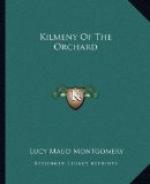She did not tell him how glad she was, and how unhappy she had been over the thought that she was never to see him again. Yesterday she would have told him all frankly and fully; but for her yesterday was a lifetime away—a lifetime in which she had come into her heritage of womanly dignity and reserve. The kiss which Eric had left on her lips, the words her uncle and aunt had said to her, the tears she had shed for the first time on a sleepless pillow—all had conspired to reveal her to herself. She did not yet dream that she loved Eric Marshall, or that he loved her. But she was no longer the child to be made a dear comrade of. She was, though quite unconsciously, the woman to be wooed and won, exacting, with sweet, innate pride, her dues of allegiance.
CHAPTER XIII. A SWEETER WOMAN NE’ER DREW BREATH
Thenceforward Eric Marshall was a constant visitor at the Gordon homestead. He soon became a favourite with Thomas and Janet, especially the latter. He liked them both, discovering under all their outward peculiarities sterling worth and fitness of character. Thomas Gordon was surprisingly well read and could floor Eric any time in argument, once he became sufficiently warmed up to attain fluency of words. Eric hardly recognized him the first time he saw him thus animated. His bent form straightened, his sunken eyes flashed, his face flushed, his voice rang like a trumpet, and he poured out a flood of eloquence which swept Eric’s smart, up-to-date arguments away like straws in the rush of a mountain torrent. Eric enjoyed his own defeat enormously, but Thomas Gordon was ashamed of being thus drawn out of himself, and for a week afterwards confined his remarks to “Yes” and “No,” or, at the outside, to a brief statement that a change in the weather was brewing.
Janet never talked on matters of church and state; such she plainly considered to be far beyond a woman’s province. But she listened with lurking interest in her eyes while Thomas and Eric pelted on each other with facts and statistics and opinions, and on the rare occasions when Eric scored a point she permitted herself a sly little smile at her brother’s expense.
Of Neil, Eric saw but little. The Italian boy avoided him, or if they chanced to meet passed him by with sullen, downcast eyes. Eric did not trouble himself greatly about Neil; but Thomas Gordon, understanding the motive which had led Neil to betray his discovery of the orchard trysts, bluntly told Kilmeny that she must not make such an equal of Neil as she had done.
“You have been too kind to the lad, lassie, and he’s got presumptuous. He must be taught his place. I mistrust we have all made more of him than we should.”
But most of the idyllic hours of Eric’s wooing were spent in the old orchard; the garden end of it was now a wilderness of roses—roses red as the heart of a sunset, roses pink as the early flush of dawn, roses white as the snows on mountain peaks, roses full blown, and roses in buds that were sweeter than anything on earth except Kilmeny’s face. Their petals fell in silken heaps along the old paths or clung to the lush grasses among which Eric lay and dreamed, while Kilmeny played to him on her violin.




